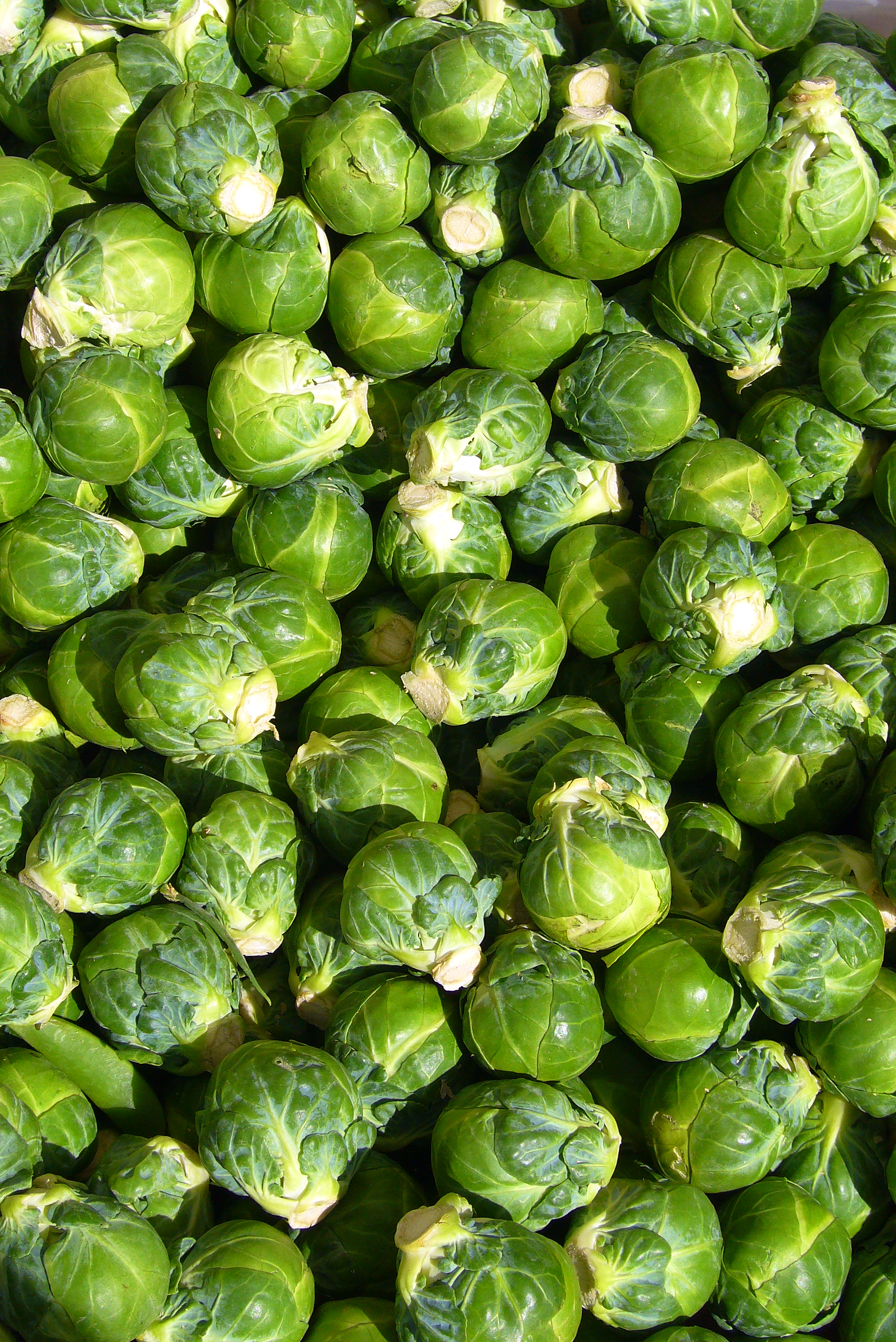- Brussels sprout
:"This article is about the plant. For the pencil game, see Sprouts (game)."
Infobox Cultivar | name = Brussels sprout

image_width = 240px
image_caption = Brussels sprouts, cultivar unknown
species = "Brassica oleracea "
group = Gemmifera Group
origin =Brussels , year unknown
subdivision = unknownThe Brussels (or brussels or brussel) sprout ("
Brassica oleracea " Gemmifera Group) of theBrassicaceae family, is a cultivar group of Wild Cabbage cultivated for its small (typically 2.5 - 4cm, 1 - 1.5 inches diameter) leafy green buds, which resemble miniature cabbages.Cultivation
Forerunners to modern Brussels sprouts were likely cultivated in
ancient Rome . Brussels sprouts as we now know them were grown possibly as early as the1200s in what is nowBelgium . The first written reference dates to 1587. During thesixteenth century they enjoyed a popularity in the southern Netherlands that eventually spread throughout the cooler parts of Northern Europe.Brussels sprouts grow in temperature ranges of 7 to 24°C (45 to 75°F), with highest yields at 15 to 18°C (60 to 65°F). Plants grow from seeds in
seed bed s orgreenhouse s, and are transplanted to growing fields.. Fields are ready for harvest 90-180 days after planting. The edible sprouts grow like buds in a spiral array on the side of long thick stalks of approximately 2-4 feet in height, maturing over several weeks from the lower to the upper part of the stalk. Sprouts may be picked by hand into baskets, in which case several harvests are made of 5-15 sprouts at a time, by cutting the entire stalk at once for processing, or by mechanical harvester, depending on variety. Each stalk can produce 1.1 to 1.4 kg (2 1/2 to 3 pounds), although the commercial yield is approximately 0.9kg (2 pounds) per stalk..Brussels sprouts are among the same family that includes
cabbage ,collard greens ,broccoli ,kale , andkohlrabi . They contain good amounts ofvitamin A ,vitamin C ,folic acid anddietary fibre . Moreover, they are believed to protect againstcolon cancer , due to their containingsinigrin . Brussels sprouts arecruciferous .USA cultivation
Production of Brussels sprouts in the United States began around 1800, when French settlers brought them to
Louisiana .cite web |url=http://www.uga.edu/vegetable/brusselsprouts.html|publisher=University of Georgia College of Agricultural and Environmental Sciences|accessdate=2007-09-21|title=Brussels Sprouts] The first plantings in California's Central Coast began in the 1920s, with significant production beginning in the 1940s. Currently there are several thousand acres planted incoastal areas of San Mateo, Santa Cruz, and Monterey Counties ofCalifornia , which offer an ideal combination of coastal fog and cool temperatures year-round. The harvest season lasts from June through January.cite web|url=http://www.oceanmist.com/html/products/brusselsprouts/bsproutgrow.aspx|accessdate=2007-09-21|publisher=Ocean Mist Farms|title=Where Brussels Sprouts are Growing Today] cite web | url=http://www.brussels-sprouts.com/BSINFO.htm|title=Brussels sprouts info|accessdate=2007-09-21|publisher=Pfyffer Associates] They are also grown inBaja California , where the harvest season is from December through June.Much of the United States production is in California, with a smaller percentage of the crop grown in Skagit Valley Washington, where cool springs, mild summers and rich soil abounds and to a lesser degree on
Long Island, New York .cite web|url=http://www.ipmcenters.org/cropprofiles/docs/cabrusselssprouts.html|publisher=|accessdate=2007-09-21|title=Crop Profile for Brussels Sprouts in California|publisher=United States Department of Agriculture] Total United States production is approximately 32,000 tons, with a value of $27 million.Ontario, Canada produces approximately 1,000 tons per year. [cite web|url=http://www.omafra.gov.on.ca/english/stats/hort/veg_m01.htm|accessdate=2007-09-21|author=Siva Mailvaganam|publisher=Ontario Ministry of Food, Agriculture, and Rural Affairs|date=2004-08-03|title=Area, Production and Farm Value ofSpecified Commercial Vegetable Crops, Ontario, 1998-2001 ] In Continental Europe the largest producers are theNetherlands , at 82,000 metric tons, and Germany, at 10,000 tons. England has production comparable to that of the Netherlands, but is not generally exported internationally. [cite web| title=The small market study: Brussels sprouts. | author=|S. Illert|publisher=SMP|url=http://www.cababstractsplus.org/google/abstract.asp?AcNo=20043210961|accessdate=2007-09-21|]80% to 85% of US production is for the
frozen food market, with the remainder for fresh consumption. Once harvested, sprouts last 3-5 weeks under ideal near-freezing conditions before wilting and discoloring, and about half as long at refrigerator temperature.. Europeans prefer smaller varieties with bulbs approximately 1.3cm (1/2 inch) in diameter, while American varieties are 2.5 - 5cm (1-2 inches).Cooking and preparation
The usual method of preparing a Brussels sprout for cooking is first to cut off the base together with any remaining stem, and then to peel away and discard the surface leaves that are loosened by this cut. When boiling or steaming, some cooks will cut a cross in the stem to aid the penetration of heat to the center of the sprout. In
December 2007 ,Ireland 's Food MinisterTrevor Sargent described his preferred method of cooking of Brussels sprouts: placing the sprouts in a single layer in a saucepan, covering them in just enough water to cover the stalks and boiling with salt and butter until the water is absorbed. [cite web|accessdate=2007-12-08|title=Food Minister Trevor Sargent promotes seasonal eating while inspecting the Brussels sprout crop for Christmas|publisher=Ireland Department of Agriculture, Fisheries & Food|url=http://www.agriculture.gov.ie/index.jsp?file=pressrel/2007/252-2007.xml|date=2007-12-04] Microwaving, stir frying, roasting and steaming are also options.Overcooking releases
sulfur compounds in the vegetable that give it a distinctive smell commonly found unpleasant. If correctly cooked, the unpleasant smell is avoided and the vegetable possesses a delicate nutty flavor.In the UK, Brussels sprouts are a traditional winter
vegetable , and are often eaten boiled with a roast dinner, particularly atChristmas . They can also be stir-fried, roasted, or made intosoup .Gallery
Grammatical usage
The term Brussels sprout is a
countable noun whose plural form is Brussels sprouts. A commonly used alternative form is brussel sprout, whose plural is brussel sprouts. However, linking the name with the Belgian capital ofBrussels would argue against dropping the last "s" in the first word (although the Dutch name for the city is "Brussel").Style consideration
Some house styles (e.g., "the Chicago Manual of Style") prefer to lowercase words derived from geographical names when used with a non-literal meaning: brussels sprouts.References
External links
* [http://database.prota.org/dbtw-wpd/exec/dbtwpub.dll?AC=QBE_QUERY&BU=http%3A%2F%2Fdatabase.prota.org%2Fsearch.htm&TN=PROTAB~1&QB0=AND&QF0=Species+Code&QI0=Brassica+oleracea+Brussels+sprouts&RF=Webdisplay PROTAbase on "Brassica oleracea (Brussels sprouts)"]
* [http://www.ibiblio.org/pfaf/cgi-bin/arr_html?Brassica+oleracea+gemmifera "Brassica oleracea gemmifera"] - Plants For a Future database entry
* [http://postharvest.ucdavis.edu/produce/producefacts/Veg/brussels_sp.shtml Brussels Sprouts] - recommendations for maintaining postharvest quality (UC Davis)
* [http://www.nutritiondata.com/facts/vegetables-and-vegetable-products/2362/2 Brussels Sprouts Nutrition] - nutritional information on raw Brussels Sprouts.
Wikimedia Foundation. 2010.
